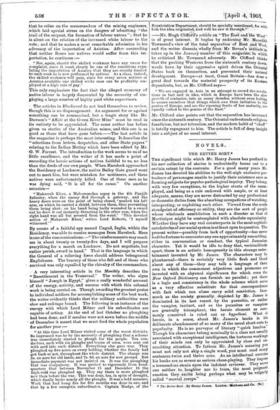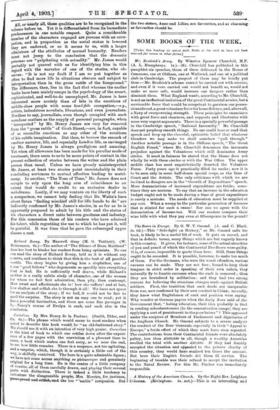NOVELS.
THE BETTER SORT.* Tan significant title which Mr. Henry James haa prefixed to his new collection of stories is undoubtedly borne out to a certain extent by the contents. For a good many years Mr. James has devoted his abilities to the well-nigh exclusive per. traiture of personages unable to justify their existence save as forming subjects for psycho-pathological inquiry. They belong, with very few exceptions, to the higher strata of the unem- ployed, and being as a rule endowed with ample, or at least adequate, means, they are never distracted by any professional or domestic duties from the absorbing occupations of watching, interpreting, or exploiting each other. Viewed from the crude standpoint of efficiency, or utility, they are the sort of people whose wholesale annihilation in such a disaster as that of Martinique might be contemplated with absolute equanimity. Whether they have any real counterparts in the most sophista catedcircles of our social system is at least open to question. The present writer—possibly from lack of opportunity—has never had the fortune to encounter any one approximately resembling, either in conversation or conduct, the typical Jamesian character. Yet it would be idle to deny that, verisimilitude apart, there is an artistic homogeneity in this strange enter. tainment invented by Mr. James. The characters may be phantasmal—thefe is certainly very little flesh and blood about any of them—they may talk a, language of their own in whioh the-commonest adjectives and pronouns are invested with an abysmal significance for which even the New Oxford Dictionary can furnish no parallel; yet there is a logic, and. consistency in the whole scheme which serve as a very effective ;substitute for that .correspondence with fact which can alone carry solid conviction.. Inas. much as the society generally., depicted by Mr. James is dominated in its last resort by the parasitic, or rather the vampire, instinct, and as the parasites or vampires are generally triumphant, the heroic element as com- monly conceived - is ruled, out ex hypothesi. What a heroic, in a sense, about Mr. James's books is his deliberate abandonment of so many of the usual abort-cuts to popularity. He is no purveyor of literary "quick lunches.' Though his characters belong nominally to a class not usually associated with exceptional intelligence, the tortuous workings of their minds can only be appreciated by close and un- remitting attention. To fathom Mr. James's meaning YOU must not only not skip a single word, you must read man! sentences twice and thrice over. As an intellectual exercise his books are as severe as serious chess-playing. They ima08e a tremendous strain .upon the indolent reviewer. They move
one neither to laughter nor to tears; the most poignant
vulgarly emotion they excite being perhaps what may be
called "mental creeps."
••11. Better Sort. By Henry Teams. Loadoisralethoes and On - [60-3 All, or nearly all, these qualities are to be recognised in the volume before us. Yet it is differentiated from its immediate predecessors in one notable respect. Quite a considerable number of the characters engaged are persons with an occu- pation' and in proportion as the social status is lowered they are endowed, or so it seems to us, with a larger admixtme of the attributes of normal humanity. Readers must not jump to the conclusion that the dramatis personae are "palpitating with actuality." Mr. James would probably not quarrel with us for identifying him in this regard with the narrator of one of the stories, who oh- serves: "It is not my fault if I am so put together as often to find more life in situations obscure and subject to interpretation than in the gross rattle of the foreground." The difference, then, lies in the fact that whereas the earlier books have been mainly-essays in the psychology of the smart, sophisticated, and well-to-do unemployed, Mr. James is here interested more acutely than of late in the emotions of middle-class people with some bond-fide occupation,--e.g., artists, industrious novelists, librarians, and even journalists. Needless to say, journalists, even though occupied with such mundane matters as the supply of personal paragraphs, when "interpreted" by Mr. Henry James are very far removed from the "gross rattle" of Grub Street,—are, in fact, capable of as recondite emotions as any other of the creations of his subtle imagination. But then, to borrow the remark of another narrator, life, and especially London life, as envisaged by Mr. Henry James is always prodigious and amazing. Yet when all allowance has been made for his peculiar mode of treatment, there seem to us to be more points of contact in the present collection of stories between the writer and the plain person than usual. Unless we have grossly misinterpreted Mr. James, at least two stories point unmistakably in their concluding sentences to mutual affection leading to matri- mony. In another, "The Tone of Time," Mr. James does not scruple to rely upon the long arm of coincidence to an extent that would do credit to an exclusive dealer in melodrama. Lastly, if we may venture on the liberty of such a comparison, we cannot help feeling that Dr. Watts's lines about Satan "finding mischief still for idle hands to do" are indirectly confirmed by Mr. James's stories, in so far as lie is apparently prepared to admit by his title and the status of his characters a direct ratio between goodness and industry. For this concession those of his readers who have admired his talent, while regretting the use to which he has put it, will be grateful. It was time that he gave the submerged upper classes a rest.











































 Previous page
Previous page